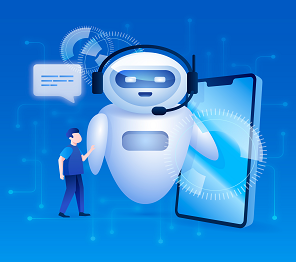In the rapidly evolving world of customer service, businesses are constantly seeking innovative ways to enhance the customer experience while optimizing operational efficiency. One technology that has emerged as a powerful tool in achieving these goals is Artificial Intelligence (AI). In this blog post, we'll explore the increasingly pivotal role that AI plays in modern customer service and how it is reshaping the way businesses interact with their customers.
Understanding AI in Customer Service
Artificial Intelligence, often referred to as AI, refers to the simulation of human intelligence in machines programmed to think and learn like humans. In customer service, AI is employed to automate and improve various aspects of the customer experience. Here are some key areas where AI is making a significant impact:
1. Chatbots for Instant Customer Support
One of the most visible applications of AI in customer service is the use of chatbots. These AI-powered virtual assistants can engage with customers in real-time, answering frequently asked questions, resolving issues, and providing guidance. Chatbots are available 24/7, ensuring that customers can get assistance whenever they need it, leading to higher customer satisfaction.
2. Personalized Customer Experiences
AI algorithms can analyze customer data to create personalized experiences. By understanding a customer's preferences, purchase history, and behavior, businesses can tailor product recommendations, marketing messages, and interactions. This personalization not only enhances the customer's journey but also drives sales and loyalty.
3. Efficient Data Analysis
AI can sift through vast amounts of customer data at high speeds, identifying patterns and trends that might be difficult for humans to discern. This data analysis enables businesses to make informed decisions about their products, services, and customer interactions. It also helps in predicting customer needs and potential issues, allowing proactive problem-solving.
4. Automating Routine Tasks
AI can take over repetitive and time-consuming tasks, freeing up human agents to focus on more complex and value-added activities. This includes data entry, appointment scheduling, and basic troubleshooting. As a result, human agents can deliver a higher level of service for tasks that require empathy and creativity.
5. Multilingual Support
AI-powered language translation and natural language processing (NLP) capabilities make it possible for businesses to provide support in multiple languages. This is especially valuable for companies with a global customer base, ensuring that language barriers do not hinder effective customer service.
6. Predictive Customer Support
AI-driven predictive analytics can forecast customer service needs and potential issues. By analyzing historical data and customer behavior, AI can alert businesses to anticipate and address problems before they become significant concerns. This proactive approach minimizes customer frustration and bolsters loyalty.
7. Continuous Improvement
AI-driven feedback loops allow businesses to continuously improve their customer service. AI systems can collect customer feedback, analyze it for insights, and suggest improvements to processes, products, or services. This feedback-driven improvement cycle ensures that customer service remains a dynamic and evolving function.
Conclusion
AI is no longer a futuristic concept; it's a vital tool in the arsenal of modern customer service. By automating routine tasks, providing instant support, personalizing interactions, and facilitating data-driven decision-making, AI enhances the customer experience while helping businesses operate more efficiently. As technology continues to advance, we can expect AI to play an even more significant role in shaping the future of customer service, providing businesses with new opportunities to delight and retain their customers. Embracing AI in customer service is no longer a choice but a necessity for companies aiming to stay competitive in today's fast-paced business environment.








